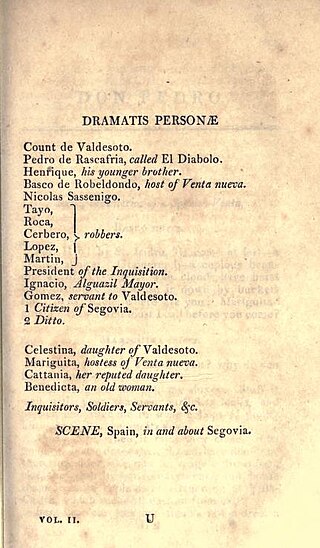
Don Pedro is a tragic play by the British writer Richard Cumberland. It was first staged at the Theatre Royal, Haymarket in London on 23 July 1796. The original cast included James Aickin as Count Valdesoto, Charles Kemble as Henrique, John Palmer as Pedro De Rascifiria, John Bannister as Basco de Robeldondo, Richard Suett as Nicolas Sassenigo, Thomas Caulfield as Tayo, George Wathen as Roca, Robert Palmer as Cerbero and Elizabeth Kemble as Celestina, Sarah Harlowe as Mariguita, Maria Kemble as Cattania and Elizabeth Hopkins as Benedicta. The epilogue was written by George Colman the Younger.
The Force of Ridicule is a 1796 comedy play by the British writer Thomas Holcroft.

He's Much to Blame is a 1798 comedy play by the British writer Thomas Holcroft.
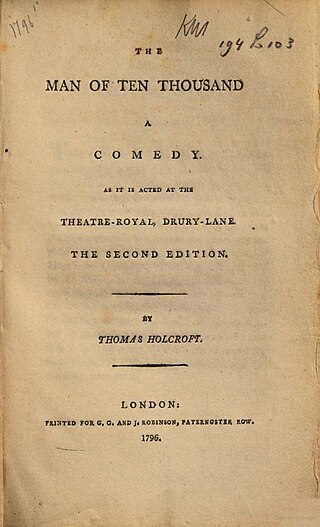
The Man of Ten Thousand is a 1796 comedy play by the British writer Thomas Holcroft.
Seduction is a 1787 comedy play by the British writer Thomas Holcroft.
Knave or Not? is a 1798 comedy play by the British writer Thomas Holcroft.

Zorinski is a 1795 historical tragedy by the British writer Thomas Morton. It first appeared at the Theatre Royal, Haymarket in London with a cast that included William Barrymore as Zorinski, James Aickin as Casimir, King of Poland, Robert Bensley as Rodomsko, Charles Kemble as Radanzo, John Bannister as Zarno, John Henry Johnstone as O'Curragh, Richard Suett as Amalekite, John Fawcett as Witski, Thomas Caulfield as Naclo, Elizabeth Kemble as Rosolia and Maria Bland as Winifred. It included music composed by Samuel Arnold. The Irish premiere was at the Crow Street Theatre in Dublin on 28 November 1795. It is also known by the alternative title Casimir, King of Poland

The Rival Sisters is a 1793 tragedy by the Irish writer Arthur Murphy. His final play, it premiered at the Theatre Royal, Haymarket in London on 18 March 1793. It had been first written in 1783 and then published in 1786. It was staged by the company of the Drury Lane company under Richard Brinsley Sheridan who were at the Haymarket while their own theatre was rebuilt. The London cast included Sarah Siddons as Ariadne, Jane Powell as Phaedra, John Philip Kemble as Perithous, Richard Wroughton as Periander, King of Naxos, Robert Palmer as Theseus, John Hayman Packer as Archon and Thomas Caulfield as Aletes. It ran for around nine performances.

The Iron Chest is a 1796 play by the British writer George Colman the Younger, with music by the composer Stephen Storace. Inspired by the novel Things as They Are by William Godwin, it premiered at the Theatre Royal, Drury Lane in London on 12 March 1796. The original cast included John Philip Kemble as Sir Edward Mortimer, Richard Wroughton as Fitzharding, John Bannister as Wilford, James William Dodd as Adam Winterton, William Barrymore as Rawbold, Richard Suett as Samson Rawbold, Robert Palmer as Orson, Charles Bannister as Third Robert, Elizabeth Farren as Lady Helen, Maria Gibbs as Blanch, Charlotte Tidswell as Dame Rawbold, Nancy Storace as Barbara and Maria Theresa Kemble as Judith. The Irish premiere took place at the Crow Street Theatre in Dublin on 6 March 1797.
The Dependent is a 1795 comedy play by the British writer Richard Cumberland. It premiered at the Theatre Royal, Drury Lane in London on 20 October 1795. The original cast included Thomas King as Lord Leverington, Richard Suett as Sir Clement Canteser, John Philip Kemble as Edmund D'Alincourt, James Aickin as Carrington, John Bannister as Gabriel Wrinkle, George Wathen as Isaac, John Phillimore as Thomas, Walter Maddocks as Harry, Jane Pope as Mrs Margaret and Elizabeth Farren as Jane.
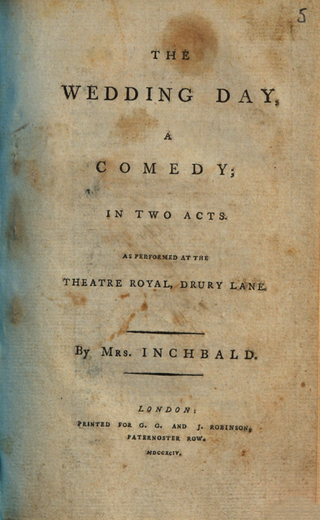
The Wedding Day is a comedy play by the English writer Elizabeth Inchbald. An afterpiece, it premiered at the Theatre Royal, Drury Lane in London on 1 November 1794. The original cast included William Barrymore as Lord Rakeland, Thomas King as Sir Adam Contest, John Hayman Packer as Mr Millden, Charles Kemble as Mr Contest, Charlotte Tidswell as Lady Autumn, Dorothea Jordan as Lady Contest, Elizabeth Hopkins as Mrs Hamford and Elizabeth Heard as Hannah. The Irish premiere took place at the Crow Street Theatre in Dublin on 15 February 1797.
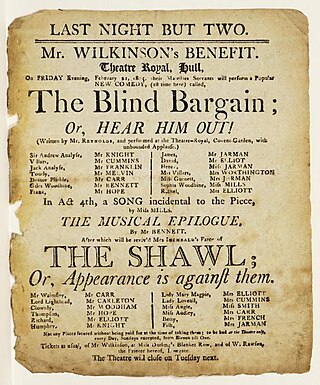
The Blind Bargain is an 1804 comedy play by the British writer Frederick Reynolds. It premiered at the Theatre Royal, Covent Garden in London on 24 October 1804. The original cast included John Fawcett as Sir Andrew Analyse, Charles Farley as Jack Analyse, William Thomas Lewis as Tourly, Charles Kemble as Villars, William Blanchard as Doctor Pliable, John Emery as Giles Woodbine, Maria Gibbs as Mrs Villars and Mary Ann Davenport as Miss Gurnet. Its Irish premiere was at the Crow Street Theatre in Dublin on 1 December 1804.

Adelaide is an 1800 historical tragedy by the English writer and poet laureate Henry James Pye. It premiered at the Theatre Royal, Drury Lane in London on 25 January 1800. The original cast included Sarah Siddons as Adelaide, James Aickin as King Henry, John Philip Kemble as Prince Richard, William Barrymore as Prince John, Charles Kemble as Clifford, Thomas Cory as Legate and Walter Maddocks as Officer and Elizabeth Heard as Emma. It is set during the reign of Henry II.
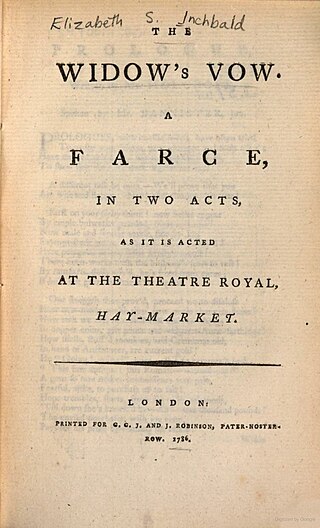
The Widow's Vow is a 1786 comedy play by the English writer Elizabeth Inchbald. A farce, it premiered as an afterpiece at the Theatre Royal, Haymarket on 20 June 1786. The original cast included William Parsons as Don Antonio, John Bannister as Marquis, Robert Palmer as Carlos, John Edwin as Jerome and Mary Wells as Flora. The playwright Thomas Holcroft wrote the prologue.
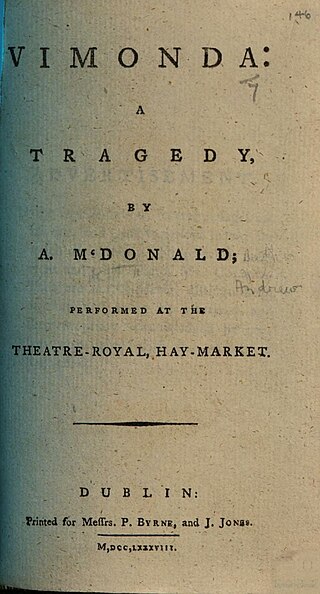
Vimonda is an 1787 tragedy by the Scottish writer Andrew Macdonald. After first appearing at the Theatre Royal, Edinburgh in was then staged at London's Theatre Royal, Haymarket on 5 September 1787. The original Haymarket cast included Elizabeth Kemble as Vimonda, Stephen Kemble as Rothsay, John Bannister as Melville, Robert Bensley as Dundore, James Aickin as Barnard and Frances Barnet Woollery as Alfreda.

False Appearances is a 1789 comedy play by the British politician and general Henry Seymour Conway, inspired by the 1740 French play Trompeurs Dehors by Louis de Boissy. It appeared at the Theatre Royal, Drury Lane in London on 20 April 1789. The Irish premiere took place at the Crow Street Theatre in Dublin on 13 July 1789 The original Drury Lane cast included John Philip Kemble as Marquis, Richard Wroughton as Baron, William Parsons as Governor, John Bannister as Abbé, Robert Palmer as Robert, Elizabeth Farren as Countess, Anna Maria Crouch as Lucile, Priscilla Kemble as Caelia and Jane Pope as Lisette. The epilogue was written by John Burgoyne.
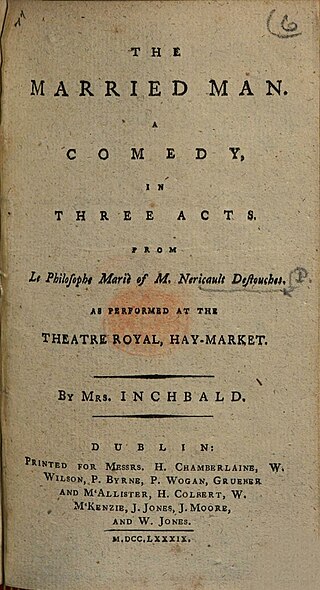
The Married Man is a 1789 comedy play by the English writer Elizabeth Inchbald, inspired by the 1727 French play Le Philosophe Marié by Philippe Néricault Destouches. It premiered at the Theatre Royal, Haymarket in London on 15 July 1789. The original cast included John Palmer as Lord Lovemore, John Bannister as Sir John Classick, James Aickin as Mr Classick, Stephen Kemble as Tradwell Classick, James Brown Williamson as Dorimant, Elizabeth Kemble as Lady Classick and Mary Whitfield as Lucy.
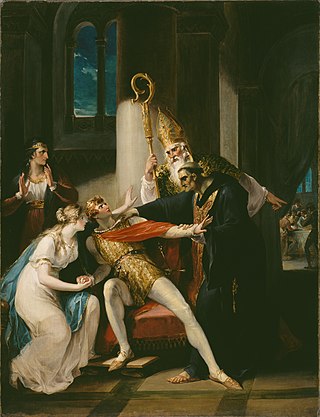
Edwy and Elgiva is a historical tragedy by the English writer Fanny Burney. Written in 1790 it was first performed at the Theatre Royal, Drury Lane in London on 21 March 1795. The original cast included John Philip Kemble as Edwy, Sarah Siddons as Elgiva, John Palmer as Aldhem, William Barrymore as Cedric, Thomas Caulfield as Ernulf, John Whitfield as Redwald, Robert Bensley as Dunstan, Robert Benson as Orgar, Charles Kemble as Sigebert, John Hayman Packer as Leofric, Walter Maddocks as Peasant, John Phillimore as Ruffian and Jane Powell as Eltruda. The prologue was written by the author's brother Charles Burney. Despite its high-profile cast including three members of the Kemble dynasty, it was withdrawn after only one performance.
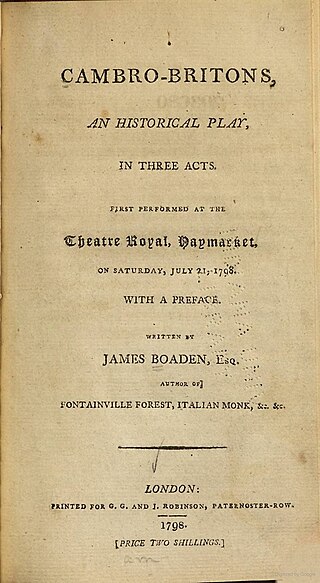
Cambro-Britons is a 1798 historical play by the English writer James Boaden. It premiered at the Theatre Royal, Haymarket in London on 21 July 1798. The original cast included William Barrymore as Llewellyn, Joseph Shepherd Munden as Shenkin, Robert Palmer as Wadwall, Richard Suett as Gwyn, John Henry Johnstone as O'Turloch, Henry Erskine Johnston as Bard, William Davies as King Edward, Charles Kemble as Prince David, Thomas Caulfield as Mortimer, George Davenport as Hereford, George Wathen as Doorkeeper, Maria Theresa Kemble as Elinor, Maria Gibbs as Lady Griffith's Shade and Maria Bland as Winifred.
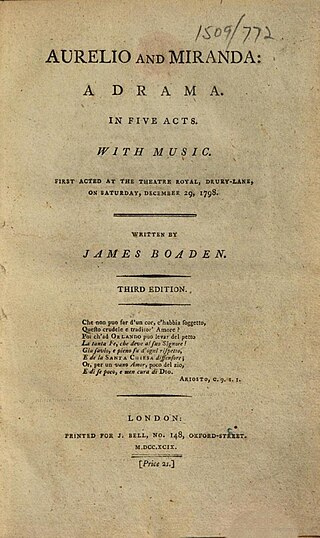
Aurelio and Miranda is a 1798 play by the British writer James Boaden, inspired by Matthew Gregory Lewis 1796 novel The Monk. It premiered at the Theatre Royal, Drury Lane on 29 December 1798. The original cast included John Philip Kemble as Aurelio, Sarah Siddons as Miranda, William Barrymore as Raymond, Charles Kemble as Lorenzo, John Bannister as Christoval, Walter Maddocks as Hilario, Ralph Wewitzer as Pedro, Jane Powell as Agnes, Charlotte Tidswell as St. Agatha, Maria Bland as Zingarella, Sarah Sparks as Leonella and Elizabeth Heard as Antonia.
















